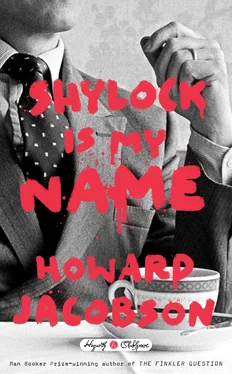He waited for her to tell him what she thought. They spoke so often for so long when she was alive. They spoke and spoke. When she was no longer there to speak to him it was as though a cord connecting him to life was severed. He would go to the synagogue to speak to other men but their company could not replace hers. Theirs had not been a synagogue marriage. They spoke ideas, not faith. Leah had never been circumscribed by convention or tradition. She was like a fountain of clear, fresh thought. So when she went, his throat dried and his mind atrophied. He didn’t want to see anything, because where was the value of sight if what he saw he could not share with her? He closed his ears to music. He stopped reading until he began to read to her again at her graveside. He saw no point in activity, and would sit for hours, thinking nothing, in a vacancy that was nearer to non-existence than sorrow. What had his life been to him before Leah? He couldn’t remember. There was no before Leah. That his house became a hell for his daughter who couldn’t rouse him or interest him in her life he accepted. Leah’s death made him a bad father. Or, if he’d been a bad father before — a man who lived only for the love he bore his wife — the death of that too-loved wife made him a worse one. Poor, poor Jessica then, doubly deprived. No wonder. No excuse, but no wonder. And when he did rediscover some of his old energy it hadn’t been out of any renewed concern for her well-being. He wished he could have lied to himself. And to her. I lived again for you, Jessica, I remembered what I owed you. But the truth of it was different. It had been the Gentiles who had pricked him back into animation. In their contempt he found the twisted stimulus to live again.
It is rage not love that propels a man to action.
When he looked up he saw Strulovitch occupying his own patch of garden, walking to and fro, a man without a wife to talk to, lost in reflection, moving his lips soundlessly.
He had no trouble reading what Strulovitch was saying. “I will do such things…”
He was sympathetic to the frustration. He too would once have done such things .
What they are, yet I know not…
But at least Strulovitch had what was still to come to look forward to. What things they were, yet he knew not. Whereas Shylock was busted. What he’d done he’d done, and what he had yet to do, he never would do now.
I miss the future, Shylock thought.
“So tell me,” he again asked Leah. “Do I restrain him or whip him up into the vengeful rage he’s been longing for all his life?”
The cold earth in which Leah was rolled around gave its deepest moan.
“Very well then,” Shylock said. “In this, as in everything else, I will be guided by you.”
—
“What do we do about it? What we do about it,” Plurabelle said, “is this.”
She made a sign with her thumb, meaning get them the hell out of here, on a train, a ship, a plane, anything. Just get them away.
D’Anton wasn’t sure. “Do we want to rile a man as vile as this?” he wondered.
“The Jew?”
“The wealthy Jew, yes.”
“The Hebrew?”
“E’en him. The moneybags, who else?”
They laughed. It was fun, even in worrying times, to play Jewepithets.
“Now I’ve lost my thread. Would you be so good as to repeat your question,” Plurabelle begged.
“I asked how good an idea it was to rile the Jew.”
“You mean the inexecrable dog—”
“Stop it, Plury!”
“Must I?”
“You must. I ask again: how good an idea is it to rile him?”
“Do you care about our friends?”
“I care about Gratan. Forgive me if the Jew’s daughter means a little less to me.”
“Well she means a great deal to me. I won’t have her judged by that pig she calls a father.”
“Pig refuser, surely.”
“A pig can refuse a pig. But take my point. She is not him, any more than I was mine.”
“Yours, I imagine, was another order of father,” D’Anton said.
“Well he wasn’t an Israelite, a werewolf, a castrator and a bloodsucker, if that’s what you mean.”
“I mean something along those lines, yes.”
“But I love her despite her father the thick-lips — I assume he has thick lips, I haven’t seen him.”
“Thick and wet.” He was careful not to look at her lips.
“As I suspected. Whereas hers are full and voluptuous.”
“Like yours.”
“Thank you. But stay focussed. Gratan loves her. And I demand that you love her.”
“So why can’t they stay here until the storm blows over.”
“Because the storm might not blow over, and I don’t want that hook-nose — I assume he has a hook nose: don’t answer — banging on my doors. You know the press — they will love this. Besides, the lovers need some time on their own. Beatrice is looking a little flaky to me. She and Gratan have been fighting already. She could easily decide she’s made a big mistake. And you know what Gratan’s like. Two minutes of not getting all he wants and he’ll be off looking for another wife.”
“But how can they go away anyway? He’s got a team to play for. He can’t come running back every weekend.”
“Isn’t he suspended for that salute thing?”
“That was a year ago or more.”
“Couldn’t we get him suspended again? Get him to use the ‘n’ word? Or punch someone?”
“Only too easily But he wouldn’t thank us for that. Another suspension could be the end of his career.”
“Then let’s get him compassionate leave. I know all the managers. There isn’t one of them that doesn’t want to be on my show.” She tossed her hair, knowing how silly she could be about herself—“Or in my bed. Trust me, I already have him in my pocket. What’s his name?”
“I just don’t know about this,” D’Anton said. Things were getting complicated. He could no longer work out how any course of action impacted on any other. Where did this leave Barnaby’s hopes? What would squirrelling the pair out of the country do to D’Anton’s own plan of wrong-footing Strulovitch by promising to support his application for a gallery in return for the Solomon Joseph Solomon? Suddenly, everyone was looking the loser.
He wasn’t sure either what removing the lovers from all society but their own would do to their feelings for one another. Plury was right: Gratan bored easily. And Beatrice, with no intrigue to distract her, and no father to fight, might discover that Gratan wasn’t all that interesting a conversationalist. She might even tire of him erotico-aesthetically and decide that circumcision had much to recommend it after all. Leave aside the religious aspect, and D’Anton — a lover of beauty in all its forms — preferred the look of the foreskin gone to the look of foreskin intact. How it was that the Jews — a people with no instinct for beauty whatsoever — should have reached that conclusion all on their own, D’Anton couldn’t understand. If anything he’d have expected them to go the other way — append a foreskin where nature had not intended one to be. Make ugly what had originally been lovely. He could only assume that somewhere in the course of their rejection of the ancient world they’d encountered a few pagan connoisseurs of male pulchritude. Whatever the explanation, it wouldn’t surprise him if Beatrice before too long came around to his way of seeing. And then what?
One possibility was that Gratan would be persuaded by her pleas, Beatrice would be reconciled to her father, whereupon, all honour satisfied, a grand Jewish wedding would be held in Haddon Hall or Thornton Manor or even, given Strulovitch’s labyrinthine contacts, Chatsworth.
For reasons he could not have put into words, such a prospect plunged D’Anton into the deepest gloom.
Читать дальше












